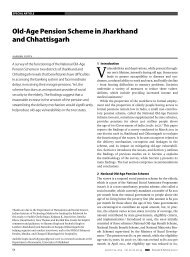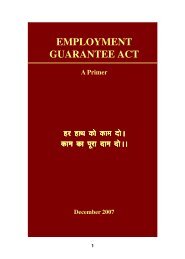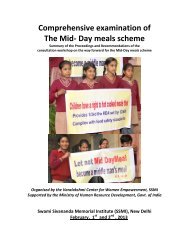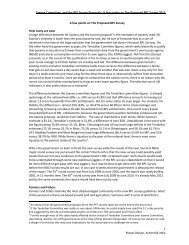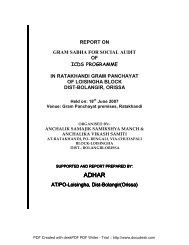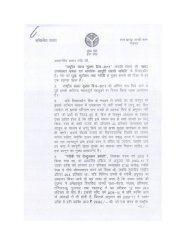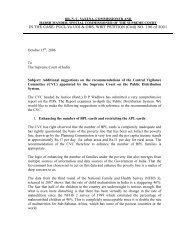NREGA: Opportunities and Challenges - Diksha
NREGA: Opportunities and Challenges - Diksha
NREGA: Opportunities and Challenges - Diksha
Create successful ePaper yourself
Turn your PDF publications into a flip-book with our unique Google optimized e-Paper software.
<strong>NREGA</strong>: OPPORTUNITIES AND CHALLENGESLove of labour lostIrrational wage formula makes creation of productive assets difficult, thus making theprogramme less relevant to local needsCSE’s analysis of the programme in nine states attributes the low dem<strong>and</strong> for jobs under <strong>NREGA</strong> tothe government’s inability to articulate it as more of a development programme rather than just awage employment one.This state of affairs, of course, could have been rectified if governments would have made the effort tohardsell the larger benefits of the Act: productive assets creation at the village level. However, localofficials <strong>and</strong> ill-informed Panchayat members failed to do so. In fact, CSE’s analysis shows that thedem<strong>and</strong> for employment under <strong>NREGA</strong> went up in many districts where Panchayats were proactive in takingup productive assets creation (like tank digging <strong>and</strong> soil conservation). Looking at the number of worksunder <strong>NREGA</strong> in the current fiscal, it is clear that the dem<strong>and</strong> for work has gone up since the governmentallowed soil <strong>and</strong> water conservation works on private l<strong>and</strong>s of scheduled tribe <strong>and</strong> scheduled caste (SC/ST)households. According to the Union rural development ministry, the percentage of works done on privatel<strong>and</strong>s of SC/ST communities has gone up from 10.68 per cent in 2006-07 to 12.24 per cent in 2007-08.The situation, therefore, has turned into avicious cycle. Lack of awareness, lessfocus on productive assets <strong>and</strong> a low <strong>and</strong>insecure wage scheme leads to lowdem<strong>and</strong> for work under <strong>NREGA</strong>. This forcesPanchayats to give priority to road <strong>and</strong>other construction works, which in turnmakes the programme less lucrative in thelong term for local communities – <strong>and</strong>lowers the dem<strong>and</strong> for work under it.Wage woesThere have been widespread reports ofbelow minimum <strong>and</strong> delayed wage paymentunder <strong>NREGA</strong>. The CSE analysis found thisto be the case in all the states that theCentre studied, except in Tamil Nadu.While government agencies admit theproblems with wage payment, what has notbeen clearly brought out is their impact onthe types of works undertaken. The CSEanalysis establishes that due to the erraticwage rates based on an archaic publicworks department formula, Panchayats areincreasingly dem<strong>and</strong>ing more road <strong>and</strong>other construction works — because roadconstruction gets them the minimum wage<strong>and</strong> sometimes even more than that. TheTHEY DON’T NEED <strong>NREGA</strong>Despite the implementation of <strong>NREGA</strong>, why do people stillmigrate out of Bihar’s Muzaffarpur district? A study of thedistrict’s five Panchayats shows that <strong>NREGA</strong> has not beenable to replace the job dem<strong>and</strong>s of local people, mostlycasual agricultural labourers.<strong>NREGA</strong> guarantees 100 days of works; that, too, isirregular. Under <strong>NREGA</strong>, the district has initiated severalsmall works such as road repair or building of waterharvesting structures in a staggered manner. On the otherh<strong>and</strong>, most of the casual workers get around 300 to 325days of regular work in urban areas. Under <strong>NREGA</strong>, aworker gets Rs 115, Rs 100 <strong>and</strong> Rs 75 a day for skilled, semiskilled<strong>and</strong> unskilled works, respectively. In privateconstruction work in urban areas, a skilled labourer gets Rs150 a day. So, the migration continues <strong>and</strong> dem<strong>and</strong> forwork under <strong>NREGA</strong> has dipped.In fact, there is a serious shortage of skilled workersnow. Panchayats hardly get any skilled workers for workslike construction of roads <strong>and</strong> concrete dams. This, in turn,forces Panchayats to take up works that only requireunskilled workers.Source: Based on reports from Ajeet Kumar Dwivedi, CSEMedia Fellow, 200731



